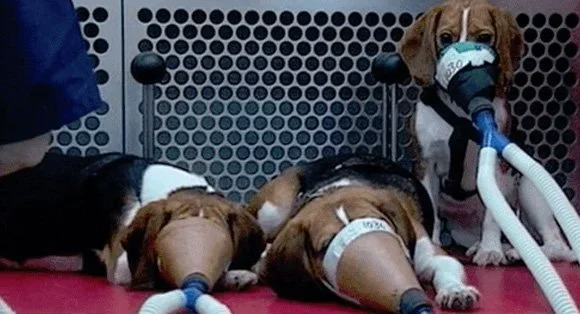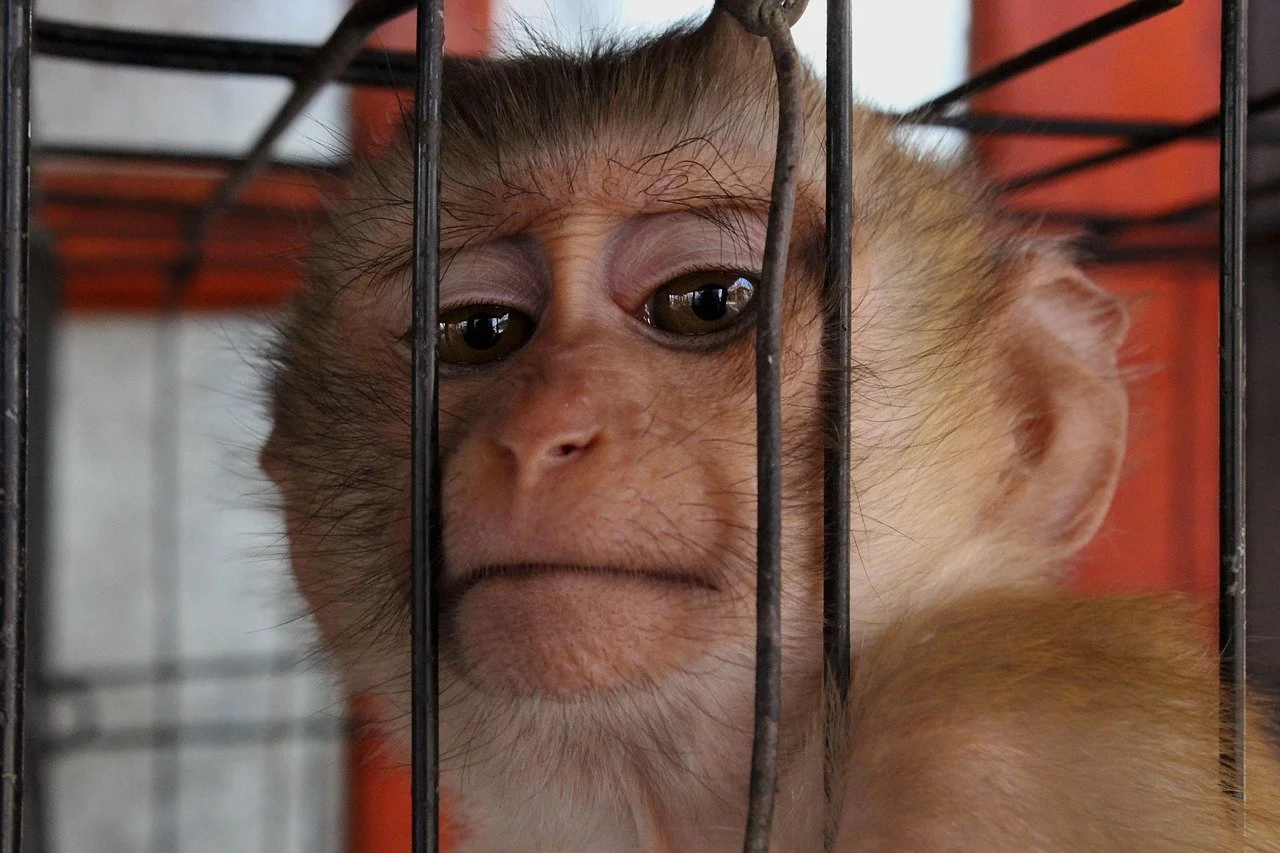Yes, beagles are still being tested on in laboratories
Abusing these docile dogs for unnecessary experiments is not a thing of the past.
This summer, some unwelcome news shook animal lovers around the globe: the National Institute of Health (NIH) approved $12 million to be put towards research involving dogs and cats. This news was particularly shocking as it followed a promise from the NIH to reduce animal experimentation. In April, NIH director Jay Bhattacharya announced a new commitment to prioritise human-based science while reducing the numbers of animals used in research. This initiative came after multiple issues of animal-based research failing to translate well into human patients due to animals' physiologies being so fundamentally different from those of humans. Despite this, nine new grants for research involving dogs and cats were approved by the NIH following the spring's announcement, with some already active animal studies also being extended.
You may think docile, playful beagles and sterile labs have nothing to do with each other, but you'd be wrong: over 40,000 dogs are being tested on every year in the US alone. Medicines, medical devices and pesticides are among the substances being tested on dogs in this country, in experiments that involve them being force-fed potentially harmful ingredients or forced to inhale them. Beagles are among the animals considered most suitable for toxicity testing, which, simplified, essentially entails observing what happens to an animal once they have been poisoned. Even if they survive the poisoning, most dogs are killed after the experiment is concluded – including young puppies – with the intention of studying the impact that the experiment has had on their internal organs. Drug, pesticide and chemical companies use dogs in testing, alongside universities, government-owned facilities, and other educational facilities.
The life of a beagle, or other dog, in a laboratory is no sunnier than what you'd imagine. Legally mandated “welfare practices” include particular cage measures depending on the dog's weight, light manipulations to simulate day and night, and occasional outdoor runs. The dogs' everyday life consists of cages and concrete, and these pack animals are desperate for attention – which they rarely receive. Side effects of the tests can include sores, worm infestations, abscesses, and bloody faeces. Human-disease studies on dogs in the US have included researchers at Ohio State University forcing a dog to run on a treadmill until they collapsed from a heart attack, and University of Pennsylvania breeding puppies with degenerative eye diseases, only to cut their eyes out and kill them. These are only a few examples of the ways dogs suffer in laboratories.
Photo: PETA
Why beagles?
Beagles are in fact the most commonly used breed for animal testing, due to their docile and trusting nature - but also due to their relatively small size, which allows researchers to save space on housing the dogs. In addition, once a certain species is used, that same species is likely to be used again – as the researchers already have data on that species, it is easier to compare the new data to what is already present. So, using beagles for research leads to...more beagles being used for research.
But despite the gloom, there are rays of light in the story of animal testing. One such incident is the closure of the Envigo animal breeding facility in Virginia in 2022, following multiple violations of the Animal Welfare Act. Over 4,000 beagles were rescued after the closure, with many of the animals finding new homes with adoptive families. And more is being done to ensure other animals have similar stories.
As they are considered "surplus" and not useful to laboratories, most animals are killed once research is completed - but that could soon be a thing of the past, thanks to the Companion Animal Release from Experiments (CARE) Act, a 2023 bill that would see dogs, cats, and other animals used for research given a second chance at life once the experimentation is completed. Championed by Congressman Tony Càrdenas, this bill could mean that more animals could encounter the happy endings that were granted to the Envigo beagles.
“It’s simple: if a federally funded research facility uses pets for research, then they must work to find them homes,” Congressman Cárdenas said. “We can save even more lives and get more animals adopted by passing the Companion Animal Release from Experiments (CARE) Act. My bill requires research facilities funded by the NIH to develop adoption policies for those animals. This is part of a larger effort to move away from animal-based testing and research wherever possible and toward more humane and sound scientific research.”
Monica Engebretson, North America Head of Public Affairs at Cruelty Free International, said, “The CARE Act has the potential to save hundreds of animals who are all unique individuals with personalities and a desire to live. Organizations across the U.S. are ready to help laboratory survivors find happy endings. Anyone who cares about animals should support the CARE Act.”
But while we wait for the CARE Act to pass, what truly is the key to ending animal research is alternative testing methods. Innovative science that could replace the use of animals in countless laboratories includes in-vitro technologies that expertly replicate human organs. Organs on microchips contain lab-grown cells that mimic our organs' natural behaviours; organoids are miniature versions of human organs that show the effects of a substance much more accurately than using a dog's body; and other cell-based methods offer a closer look at exact models of human physiology. Non-animal methods often perform better than resorting to animals, whose bodies do not resemble our own in ways significant enough to produce a reliable result. In other words, we've been relying on “the next best thing” for too long.
Are we any closer to ending animal testing?
It is still an uphill climb - but we'd be well on our way if the majority of Americans had their say. A 2024 survey found that 80% of the polled US citizens agreed or strongly agreed that animal experimentation should be phased out. The FDA has announced plans to phase out animal-based research for monoclonal antibodies and several other drugs, and 12 states have bans on testing cosmetics ingredients on animals. Since the 70s, the US has seen a 75% decline in dogs and cats being used in laboratories, with some experts predicting the end of the use of these animals within the next decade.
Hope is alive – but to truly affect changes that could get dogs out of laboratories forever, collective action is needed. Advocating for change on a policy level, voting for officials that aim to implement change, and supporting organizations that work on alternative testing methods goes a long way.
30,000 Monkeys in Our Backyard
Watch the documentary:
In 2023, an unknown but well-funded corporation—misleadingly named Safer Human Medicine—came to Bainbridge, Georgia, and worked a secret deal with local politicians to build the largest primate import warehouse in the U.S., designed to confine up to 30,000 monkeys for use in the U.S. animal-testing industry. The CEO behind the facility? Jim Harkness: chief operating officer of Envigo beagle-breeding facility.
Species Unite’s new documentary ‘30,000 Monkeys in Our Backyard’ tells the full story.
We Have A Favor To Ask…
Species Unite amplifies well-researched solutions to some of the most abusive animal industries operating today.
At this crucial moment, with worldwide momentum for change building, it’s vital we share these animal-free solutions with the world - and we need your help.
We’re a nonprofit, and so to keep sharing these solutions, we’re relying on you - with your support, we can continue our essential work in growing a powerful community of animal advocates this year.






Animal testing for cosmetics seems like a thing of the past – but it's still an ongoing battle.